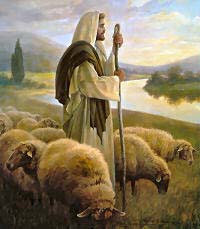Blog Detail
Blog DetailFOURTH SUNDAY OF EASTER – GOOD SHEPHERD SUNDAY

READINGS:
1st Reading: Acts 4:8-12
Psalms: 118:1.8-9.21-23.26.28.29
2nd Reading: 1Jn 3:1-2
Gospel: Jn 10:11-18
A GOOD SHEPHERD AMIDST COVID -19
A HOMILY BASED ON THE THEME OF A GOOD SHEPHERD AFTER JESUS CHRIST
Shepherding in ancient Israel
In the ancient Israel, shepherding was not uncommon. Majority of Israelites were pastorists. They tended the sheep in the fields. Many were hired shepherds to watch over and look after the flock. Therefore, the primary responsibility of every shepherd was to make sure of the safety and welfare of the flock. A shepherd was expected to graze the animals to areas of good forage and keeping a watchful eye against wolves, thieves and poisonous plants.
Shepherding was a difficult task because shepherds spent most of their time in the field with the flock. Sometimes they could take days on end in the field before they came home.
Another challenging part of shepherding in Israel was that shepherding was not compatible with family life; shepherds, because they stayed for long in the field, and uncertain steady income, they could not commit themselves to marriage. They therefore remained single, without wife or children.
Shepherds also were likely to be susceptible to danger of meeting treacherous wild animals who could threaten the life of the flock and even their own life.
Despite the dangers, shepherds were expected to defend the flock.
Qualities of a good shepherd
A good shepherd was supposed to be a good guide of the sheep. A good guide brought the flock to good pasture to graze. He would bring the flock to safety areas to rest.
A good shepherd exercised patience because some members were difficult to tend; they could run away from the flock.
A good shepherd loves his sheep more to the extent of losing his life by defending the sheep against enemies that would devour the flock.
A shepherd after Jesus Christ
Jesus Christ says in the gospel of John 10:11-18 that he is a good shepherd. He lays down his life for his sheep. He is not like the hired shepherds who run away when faced with danger. He is a good shepherd because he knows his sheep and his own know him.
Knowledge of the sheep is key to good shepherding. Knowledge of the people a pastor is ministering to, is key of good shepherding. Modern pastors face this challenge of ministering to people they do not know. Sheep may hide from the eye a shepherd. A shepherd may be lazy to make an effort to get to know his own sheep.
In the Old Testament, a shepherd is related to a leader of the community. A good leader takes care of his people, watch over them for their safety. A good leader provides or creates good environment for his people to make progress. A good leader takes the welfare of the people first before his own. If we look around and see our leaders, we find out that qualities of good leadership are lacking. Let us take our civil leaders; most of them take advantage of poor administrations to harvest from public funds living the communities poorer and poorer. Poor structures in our communities is a result of poor leadership that we have.
The need for more vocations
The fourth Sunday of Easter is also The Good Shepherd Sunday. On this Sunday, the Church invites all to pray for vocations that will foster service in the Church and in the world. The world today more than ever, needs good willed people to serve selflessly, shepherds who can die for their sheep.
The Church today, more than ever, needs priests, sisters, brothers and couples who are more concerned not with their own good but the good of the people. Perhaps, other than praying for more people into priesthood or sisterhood or married life, we should pray for those already in the service to be good ministers after the heart of Jesus Christ. The people of God are crying for good ministers who are patient and selfless.
May Jesus Christ guide all pastors as they watch over the flock entrusted to them.
[Fr. Louis Chikanya]